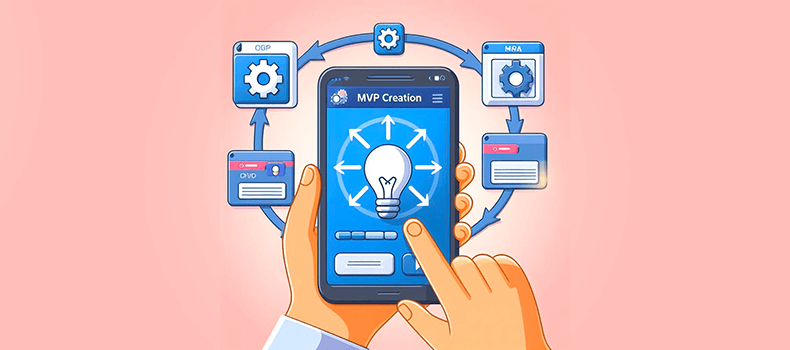Feb
8
5 Ways MVPs Power Up Agile Development

Ever wondered how software development companies launch multiple products in a single month?
The answer is, of course: Agility!
Let’s take a deep dive into agility and its continual benefits today!
What is agility?
In a dynamic industry like software development, there’s no chance of stagnation.
Imagine coding the core features of a new social media app, only to have new privacy regulations roll out just as you’re launching. It’s like building the foundation on shifting sands – the ground rules keep changing beneath your feet!
To support these constant changes, agility offers a continuous and collaborative approach to fulfill every user’s need.
To understand agile development better, we need to understand how agility functions.
The crux of agility lies in these four concepts:
1. Interactions over processes and tools
Letting go of waterfalls and siloed systems is the way to successful collaborations. Agile systems allow individuals and teams to foster invaluable co-operation and open communication throughout the development process.
2. Working software over a load full of documents
Documentation, even after being important, adds unnecessary bottlenecks in the way of constant progress. Agility, on other hand, focuses on delivering valuable functionality before time, and iterating rapidly through rapid feedback loops.
3. Customer collaborations over lengthy negotiations
Agile systems empower partnering with customers continually in the development process. It includes involving them in demos, getting their critical feedback, and aligning the final product with their ever-evolving needs through consistent iteration.
4. Quick responsiveness to external changes
To succeed, it’s necessary for businesses to see changes as opportunities for growth, product diversification and expansion. Else, they’ll be left behind in the curve.
Agile teams are rightly trained to adapt quickly to any new requirements, market changes and technological advancements. This allows constant upgradation and an ultimate seamless experience.
So, how does agility look like in practice?
Agile teams work in short sprints, where each sprint delivers a small update increment of the software. These sprint operations allow constant iteration leading to exciting changes that stay in lockstep with the changing market needs.
The teams are guided by frequent feedback, which eliminates the risk of adding any features nobody wants. Digital.ai (2022) states that 62% of pollees reported a strike in higher product quality due to these faster feedback loops.
Such agile working teams require constant and free communication. Some software development companies keep a mandatory daily stand-up call to keep every team member informed and aligned with the goal of the day.
This process doesn’t jump over to the result, rather it gives a chance to keep developing the software until a major value proposition is achieved.
For example, software development companies with an increasing usage of CI/CD pipelines can marvelously code any update in the existing file, without worrying about downtime risks. This process goes on until the ultimate product is created.
Why is there a need to go agile?
The 21st century is seeing a massive boom of constant progress in technologies around the world. This compels software companies worldwide to operate in an ever-changing and upgrading landscape.
As a corollary, it becomes impractical to get a precise and exhaustive set of software requirements. Now, it becomes paradoxical since any conventional software model wouldn’t function unless there are neat requirements defined.
Traditional development models like the waterfall, are fully relied on properly defined requirements from A to Z. These models don’t work out in the world full of iterative software development. This results in traditional models failing to give the correct market fit.
Agile development methodology acts as a remedy to this dilemma. This method is designed exactly to handle the dynamicity of this industry. It does so by focusing on development through increments while building the final market fit product.
Scaling made easier with Agile
Imagine that this agile mindset is built for a constantly globalized world. Such systems have crystal-clarity while networking and visualizing work in a dense industry. As a result, managers and heads can look at the big picture to pinpoint gridlocks and thus, make informed and well-ruminated decisions to manage the workload properly.
Businesses need to face a stark reality- conventional structure slows down their ability to adapt and strongly complete. For this, scaling agile teams should be adopted by organizations.
Scaling agile teamwork might seem overwhelming, but with the right tools you can build powerful products/services ranging from data-powered microscopes to deploying robot assistants.
Keep in mind: This requires a strong shift in the cultural paradigm; one that focuses on collaboration, learning, and customer obsession.
Why should businesses develop agile?
Mike Cottmeyer once famously said, “It’s never about developing agile, it’s always about some sort of business outcome”
The word agility shouldn’t scare businesses into confusion. It’s all about optimizing the workings of a company. Many companies develop agile to innovate, like how we explained Uber’s birth, while some start out with less financial capabilities but still wish to compete in the market.
1.Predictability
Businesses LOVE predictability. The idea of being able to code perfect solutions day in and day out excites developers completely.
Going agile allows companies to build products based on data-driven insights, resulting in achieving higher functionality and in turn, a dominant market share.
2. Quality
According to Gartner (2022), 65% of product execs find it difficult to provide high-quality deliverables with speed.
Users value quality everywhere they go. They expect products to properly fulfill their intended purposes reliably. Products with no downtime risks are preferred in this digitally powered age.
Businesses that chose agility also chose quality in a jiffy. Sprint processes and rapid feedback loops help in continuously upgrading a product’s quality to match the market expectations.
3. Resource optimization
Be it finances, or the need to have an in-house dev team- resources are to be used mindfully in all aspects of development. Agile methodologies empower businesses to optimize the usage of resources to allow stage-by-stage development.
This results in staying at the top of the curve and developing sustainably.
4. Product Fit and Innovation
Agile development offers a core unique opportunity of developing the perfect market fit. The increased emphasis on flexibility, collaboration and iteration aligns perfectly with the challenges to develop the right product for the target market.
Many companies go through the innovation route while developing an MVP. This gives them a chance to test their hypothesis, find the right audience, and be cost-efficient while doing so.
The Synergy of MVPs and Agile Development
Minimum Viable Products, or MVPs, are already created in an agile setting. With overlapping benefits such as continuous feedback and iteration, data driven insights and working in sprints, these both have resulted in 60% quicker & successful product launches in the year 2022. (Atlassian, 2022)
By leveraging the technical alignment of these methods, agile teams can build high-value products efficiently, with minimal cost, and iterative user experience.
When aligned, both methodologies provide the following benefits:
1. Low time-to-market
Through agile development method, MVPs can have quicker launches and initial testing. This is fueled by constant feedback loops resulting in iterative development.
2. High cost-efficiency
Agile development allows to break down MVPs into phases. This allows software development companies to only focus on the core functionalities of the MVP.
This causes companies to minimize investing in resources and development costs.
3. Sharp product quality
The point of building MVPs through agile development is to be iterative. To do so, the initial user feedback is used for early pinpointing and correction of bugs, leading to a product with maximum value.
4. More innovation opportunities
Quick iteration and learning cycles driven by MVPs and agile development stimulates inventive critical thinking and a culture of continuous innovation.
5. Risk Mitigation
Agile development methods and MVPs help in validating initial market assumptions and proof of concepts well early in the game. This allows software development companies to develop a risk avoidance mindset.
These insights guide the companies to take a step back in case the planned features give no value to the users.
The Agile Advantage
A study by McKinsey & Company observed that companies that adopted agile practices experienced a 70% hike in innovation speed. This means faster product launches, which offer businesses an opportunity to catch onto popular market trends. Such teams, that are given clear aims and professional autonomy.
It helps make 30% fewer defects (VersionOne) and increases an organization’s productivity by 20% (Forrester).
Wondering about happy employees?
Agile teams report having 21% higher satisfaction in their job roles and responsibilities. Having such an innovative methodology allows you to develop better using newer frameworks, DevOps pipelines and API-driven communication as your technical allies.
This system grants you chances to gather real-time data and metrics to keep progress on track, taking informed decisions and iterative development.
The bottom line is that agility mixed with tech is a growth engine for the business hungry to achieve efficiency, highest quality and market domination.
The iProgrammer Speaks
A few components of the technical requirements should be taken care of in the initial stage of development. This helps businesses/startups to determine the value provided to the market and to rule out any incompetencies.
Running an agile business is a challenge of its own that is easily mastered nowadays with newer technologies and augmented dev teams. We, at iProgrammer, feel like you should trust these stats to develop an agile system of your own.
This will not only ensure a successful product launch but will also give you opportunities for market domination. Agile systems also help in developing customer centricity through organic methods. This leads to business with scalable markets, and a higher profit margin.
To develop such systems, choosing the right tech partner defines is a pivotal step. The ideal tech partner would allow your knowledge to thrive, while your innovation is setting the market on fire.
At iProgrammer, our teams are consistently increasing at an agile rate, with specialized access to tools and new-gen technologies that target your business success. Using top-of-the-market frameworks like Azure, Tableau, Angular, Node, etc, we aim to develop seamless experiences, leading you to take over your target market.
Wanna know how to choose the right partner? Click here to know!





















































